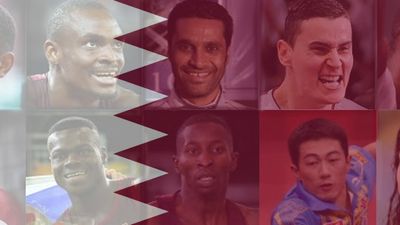How Countries Poach African Athletes To Win Olympic Medals
Changing nationalities in sports is common but what does it mean for African teams to lose great athletes to countries willing to pay more?
The 2016 Olympics begin this week in Rio amid an ongoing doping scandal that has resulted in many Russian athletes being banned from competition. But another scandal looms large—the practice of poaching African players to bolster otherwise anemic national teams around the globe.
Many Gulf countries have routinely recruited athletes from various African countries to participate in their teams, prompting accusations of unfair competition and, sometimes, of using false documents to register new roster members. And although for the 2016 Olympic games there is no evidence of wrongdoing by these countries, this year they will again feature many Africans on their teams, prompting new allegations of an uneven playing field.
Take Qatar, for example. Their men’s athletics team consists of two Sudanese-born runners, one born in Morocco, one in Nigeria, one in Egypt, one in Kenya, and only two athletes born in Qatar. Or take Bahrain. Their athletics men’s team has four athletes born in Kenya, three in Ethiopia, one in Nigeria, one in Morocco and none in Bahrain. Their women’s team also features three athletes born in Ethiopia, another three in Nigeria, one in Kenya and none born in Bahrain (although one of those born in Nigeria is half-Bahraini). Meanwhile, both women who qualified for the United Arab Emirates’ athletics team are from Ethiopia.
Changing country allegiances is not unheard of in international sports. It is quite common, though heavily regulated in international football, for example. However, the IAAF, which organizes and regulates international athletics events, is much more lax about athletes changing their nationalities. But the widespread practice of these countries have landed them in trouble before.
In 2005, a man going by the name of Tareq Mubarak Taher changed allegiance from Kenya to Bahrain. That year he won the 2000 meter steeplechase event at the World Youth Championships in Marrakech, Morocco. He was soon the object of an investigation surrounding his name and his date of birth. In 2007, it was determined that he had falsified his identity and had lied about his age in order to be able to participate in the under-17 World Youth Championships.
Another, maybe less controversial problem arose in the Asian Games in Incheon, South Korea, in 2014. Then, Qatar and Bahrain faced heavy criticism from other athletes who felt they were unjustly up against unreachable opposition. Back then, Chinese athlete Su Bingtian said about his African-born rivals that: “They are more powerful and athletic. Physically we are at a disadvantage.” Maybe Bingtian was smarting from the fact that in Incheon, 14 of 22 individual events were won by athletes of African origin.
Though this phenomenon has become more pronounced in recent years, it started since at least 2003, when many top Kenyan athletes were persuaded by Qatar and Bahrain to change national allegiances in time for the 2004 Olympics. These Gulf Nations have more funds to care for their athletes, which means better compensation, but not only. The Olympics are primarily an amateur event, in which participants compete for free, and this means that the African athletes who chose to change national teams also need other perks to be persuaded. These are usually translated to access to better training grounds, top-of-the art facilities, and better physical preparation.
The Qatari government in particular is notorious for offering large sums to those athletes it wants to recruit for their national athletic teams, a practice that has become so widespread that even absurd rumors about it get some credibility. Last year, for example, it was said that Qatar offered Kenyan javelin champion Julius Yegoone billion Kenyan Shillings (about ten million dollars) to change nationalities. Money, however, is not the only reason for the changes.
Certain African teams, in particular Kenya, Nigeria, Ethiopia and Morocco, are usually very strong and highly competitive, and it can be a challenge to find a spot to compete at the highest level for them, especially given their limited budget. Asked about his change from Kenya to Bahrain, a country he will represent in Rio, Albert Kibihii Rop said in 2014: “It’s hard to make the team in Kenya. Everyone is very strong I sought a way (to get on).” But it might also be hard for top athletes from these African countries to keep their spot in their countries of origin.
Last year, three Nigerians held the record for the fastest 100 meters in Africa, Europe and Asia. meaning that two of these, top athletes in the world, changed their nationality. One of them is Francis Obikwelu, who settled in Portugal as a teenager and, even though he competed first for Nigeria, after that country’s federation abandoned him during a career-threatening injury, he decided to switch and compete for his adopted country. Under his new citizenship, he earned a silver medal in Athens 2004, establishing an European record in the 100 meters race, 9.86 seconds.
There is also Femi Ogunode, who holds the Asian record. He says his move to Qatar in 2009, a country he will represent in Rio, when he was 18 was a “calculated risk” to escape “nepotism and corruption in Nigerian athletics.” He established the Asian 100 meters record at the Asian Athletics Championship, where he ran in 9.91 seconds.
The trend of African-born athletes changing nationalities seems likely to continue, as Turkey also has begun the practice of recruiting foreign athletes and, of course, European countries and the United States have also employed this tactic.
And though Qatar has not earned any medals in athletics from their African imports, and Bahrain only one bronze medal—for the 1,500 meters race in London 2012 —their adopted athletes have been immensely successful at continental competitions and world championships, so nothing suggests they’ll change tactics soon.
